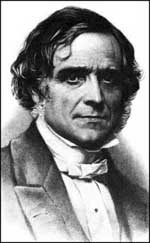
THERE is a kind of pause between Easter and Ascension Day, when we no longer think of our blessed Lord as continually with His Apostles as He was before His Passion, and yet before we contemplate Him as once again in His glorious Majesty at the right hand of the Father. The great forty days on which we have now entered, during which at intervals He was seen of those who before had been continually with Him in His temptations, and when He gave them the clearest proofs of His still being a man and still wearing that same body which they had seen nailed to and pierced on the Cross, seem especially given to us as a distinct proof of His resurrection, of the certainty of our own, we sharing in His glory, as He has shared in our humiliation. He seems thus to have desired especially to silence all doubts as to the Resurrection of the Body, and thus to have proved His victory over the world, and the grave, and the powers of evil. You may see that He gave His body powers that it had not before; thus He was evidently not recognised at once--as in the case of the two on the way to Emmaus--some even doubted when the eleven saw Him on that mountain in Galilee where He had foretold that He would meet them,--He entered the room where they were assembled when the doors were shut; but yet He evidently desired by word and action, as by reminding them by a second miraculous draught of fishes of their earliest call, asking for food and eating before them, to give them clear evidence that His resurrection in the same body was a reality and not a fancy--that it was He, the man Christ Jesus, who had overcome death and risen from the grave, and not a phantom taking His likeness, or a spirit which had no flesh or bones which they saw Him to have. And as our Easter comes to us year after year with the same stirring call to awake from our graves of carelessness or neglect, as it comes again and again with the same repeated reminder of our Lord's resurrection, the same repeated assurance of our own, so surely ought it to quicken in our sluggish hearts this sense of our Lord's victory, this realization that the battle against sin and death was then once for ever won by Him; and at the same time while year after year comes to sadden us by the removal of those we have loved, yet ought we more and more to be ready to dwell rather on the bright promise of the future Resurrection and the glorious life with Him, than only on the sadness which is thus continually forced on us that all out of Heaven must fade, that all of earth, whether earnestness, or genius, or love, is given to earth but for a time, is summoned hence when the work given to be done is accomplished, the time when God has need of it elsewhere come. Yes, it is the old, old story that our Easter has ever to bring before us, of the non-endurance of the things of the world, and the passing away of all that is bright and fair in it, of the permanence only of the things of Heaven, and of how all that is given us on earth is to be used so that when resigned here we may find it again there. And surely if death comes to us at Easter-tide, and saddens all our rejoicings, we have only the more reason to take to ourselves the consolation that the Resurrection brings with it; we have only to feel the more certainly that if every year brings our mortality more distinctly before us, and makes every one come to believe at length that he too will die, every Easter also only the more distinctly brings to us the assurance of our immortality; brings to us the certainty also that death has been overcome, and that we shall overcome it too in our own bodies; that, in short, in the Apostle's words, "as in Adam all die, even so in Christ shall all be made alive." And surely now the sight of the renewal of creation around us, in the new birth of all inanimate things in the spring-tide, brings the same idea present to our minds; as we see the seed planted to die now rising again in the fresh beauty of the blossom, we have always the thought of our own future life, after in the same way dying and becoming a prey to corruption. And thus Christianity has given a new meaning to all of the ordinary works of nature. It is very different to us from the feeling of the heathen poet who observes that the mallow and the twisted dill die in one year, but renew themselves in another, while man when he dies sleeps on his never-ending sleep. The Christian knows that his awaking will not be like theirs, to die again and have the same process repeated over again, but that he will awake to the never-ending life with his Creator,--will live again in such a shape and form as will be fitted for the work that Creator has for him to do in that higher state of existence for which this is a preparation.


No comments:
Post a Comment